Dental implants
Dental implants are replacement tooth roots. Dental implants provide a strong foundation for permanent or removable prosthesis (replacement teeth) that are made to match your natural teeth. They are manufactured from biologically neutral pure Titanium that is accepted by the human body and these implants fuse with the jawbone to form a secure foundation for tooth replacement.

Types of Dental implants
There are two basic types of implants available at our dental clinic. In certain cases, conventional or immediate implants may be followed by immediate loading of crowns and bridges known as immediate loaded implants. The type of dental implants selected will be dependent on the patients' specific needs and general dental condition. A panoramic x-ray and/or CT scan is usually required to evaluate the amount of bone, determine the space available and for a thorough examination to diagnosing the options best suited for each case.

Conventional implants are applicable to almost anyone who is looking to replace one, multiple, all missing teeth with a permanent restoration solution.
Conventional implants are done in 2 stages normally in 2 trips about 2 to 6 months apart.
Conventional implants may be done for most types of bone conditions. If there is moderate or severe jaw bone loss, bone grafting may be recommended prior to dental implantation.

Immediate implants are also known as one day or same day implants. This is the case whereby dental implants is placed during the same time after teeth are extracted.
Crowns, bridge, dentures may or may not be placed on during same trip depending on whether immediate loaded implants may be done.
Immediate implants are normally recommended only for cases with good jaw bone conditions.

Immediate loaded implants are whereby permanent or temporary crowns, bridges or dentures are placed during the same trip when the dental implant posts is embedded in jaws.
Immediate loaded implants may follow after conventional implants or immediate implants.
Immediate loaded implants are normally recommended only for cases with good jawbone conditions.
Benefits of Dental implants
- Improved selt-esteem and increased quality of life
- Reduce size and construct a more natural functional bridge or denture
- No need to trim the adjacent teeth to form the conventional bridge
- The solid anchorage of the dental implant will allow you to increase your chewing pressure, so eat anything you want
- Improves speech as compared to having dentures
- Improved comfort relative to removable dentures
- Prevent further loss of teeth and bone support
- Improved and younger, natural appearance
- Improved oral health
- Durability. Implants are very durable and have expected lifelong replacement for lost tooth
- No slipping, sliding clicking dentures or worrying about your dentures popping out in embarrassing situations
Dental implants Restoration Types
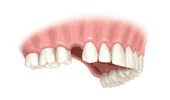
The single tooth implant restoration consists of three parts. Namely, the implant post which replaces the tooth root, the abutment which will support the crown and the prosthetic crown itself. The crown is either cemented onto the abutment or held in place with a screw.
With today's developments, there are a variety of implant systems, models and ranges available. Each line catering to the individualized needs of patients.
A single tooth implant with crown is one of the best permanent restorations. This solution both looks and functions just like a natural tooth.
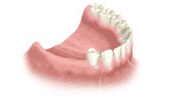
If multiple teeth are missing in different parts of the mouth, several single tooth implants are good replacement restorations.
If multiple teeth are missing within the same region, several missing teeth can sometimes be replaced with fewer implants because dental implants are stronger than the natural tooth roots. This solution includes having implant fixed bridges done.
An implant fixed bridge is very much like a conventional bridge except the support is actually over implants rather than natural teeth. The implants themselves act as man-made roots. A great advantage is that this is that it is self-supporting unlike conventional tooth-supported bridges that puts a heavier load on the remaining teeth.
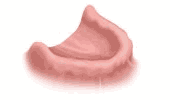
When all teeth are missing or in a condition that all teeth need to be replaced, there are two basically types of full arch implant reconstructions options:
Fixed bridges anchored to dental implants
Implant Supported Dentures
All-on-4 & All-on-6
Zygomatic Implants
Fixed Bridges anchored to dental implants. With today's technologies, it is possible to replace a full jaw with dental implants and a fixed bridge that results in a permanent, stable and high esthetic solution similiar to having a new set of teeth again.
Implant Supported Dentures. Implants allow you to wear full dentures (overdentures) and partial dentures without worrying that they will slip or fall out. Having implants to support these dentures also means that the base of the denture can be made much smaller and more comfortable. For overdentures, implants with screws placed in the jaw will serve as attachments for a metal bar, which will help support a removable denture.
Types of Dental Implants
There are a variety of dental implant systems available on the market. The two most popular systems are the ITI Straumann and Nobel Biocare implant systems. Both companies have had long-standing histories in the field of producing dental implants and have their own ranges of lines. BIDC is an official straumann dental implant and leading dental implant center in Thailand.
Other dental implants systems available on the market in Thailand includes AstraTech implants, Zimmer implants and Intralock implants
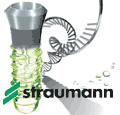
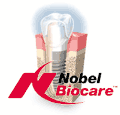
Dental Implant Procedure
The implant procedure is smiliar regardless of whether one,multiple or all teeth are missing. Below outlines what you may expect during dental implanttreatment:
1.First evaluation and x-ray
- A panoramic x-ray and oral examination is done to determine implant site and bone condition
2.Implant site preparation
- In situations where there is still a tooth, the tooth is removed. Whether immediate implants may be done is dependent on whether is any infection and bone condition. If immediate implants is not suited, the site is left to heal for about a few weeks to 2 months.
- In situations where there is insufficient bone structure, bone grafting may be a recommended additional procedure. If a moderate or major bone graft is done, the site is left to heal for about a few weeks to 2 months.
- Once healthy bone material has been established and the site is ready, the implant is ready to be put into place
3.Placing the Implant
- After the bone has been prepared, the implant is embedded and the tissue is sutured
4.Healing Process - Osseointegration
- The implant is left to integrate and heal with the jaw bone. If immediate loaded implant is suited, step 5 is done. If immediate loaded implant is not suited, the implant is left to ossointegrate for about 2 to 6 months before step 5 is done.
- The sutures are typically removed seven to fourteen days after surgery
5.Attaching the Abutment or metal bar/ball
- When the gum tissue is ready, a special abutment or metal bar/ball is attached to the implant
- If crowns or bridges are opted, an abutment is placed and this provides the support for the new crown or bridge. Today's technologies often include the abutments attached to the implant post.
- If overdentures are opted, the metal bar/ball is placed and is the the clip used to securely retend the set of new overdentures
6.Placing the Crown/Bridge or Overdenture
- A fter impressions are taken, the crown/bridge or overdenture is made
- If crowns or bridges are opted, it is then fixed over the post and cemented or screwed on.
- If overdentures are opted, they are simply snapped onto the metal bars or balls
Recovery Expectations
Following placement of the artificial roots in the jaw, the bone may be sore and the surrounding gums tender and swollen. Patients are, however, able to go about their normal daily activities a day after surgery avoiding any rigorous physical exercises or activities.
Postcare Instructions for Dental implants
- Only liquid foods may be consumed during the first day in order to avoid inadvertent food particles contaminating the wound and semi-liquid (Mashed) food added during the rest of the week
- Avoid eating or drinking anything very hot or cold during the first day after the operation
- Moderate post-operative swelling is a normal reaction. However, If you have excessive swelling, severe pain or persistent bleeding please contact the clinic
- Use antiseptic mouth wash rinses as directed
- Smoking and consumption of alcoholic beverages should be avoided
- Old dentures may not be worn until adjustments have been made. Early insertion of dentures may delay or affect healing
- Avoid putting heavy pressure around the implant site during healing period
Care for Dental implants
Dental implants require the same care as real teeth, including brushing, flossing, and regular dental check-ups:
- Brush after eating and before bedtime around the implant with a soft toothbrush
- Floss at least once to twice a day. Use the proxy brush or floss threader to remove plaque under and around these areas to maintain good oral hygiene. Buildup of food debris and plaque on your teeth and gums can become infected.
- Rinse with fluoride rinse before bed. Swish the fluoride rinse vigorously in your mouth for at least one minute. Do not swallow any of the rinse and do not eat or drink anything for 30 minutes
- Be careful about chewing toffees, gum, grainy rolls and tough food in this area
- See your dentist for regular professional check-ups and cleanings





